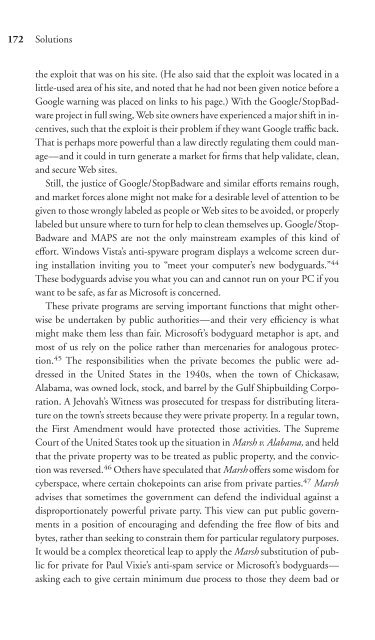Download - Future of the Internet â And how to stop it.
Download - Future of the Internet â And how to stop it.
Download - Future of the Internet â And how to stop it.
Create successful ePaper yourself
Turn your PDF publications into a flip-book with our unique Google optimized e-Paper software.
172<br />
Solutions<br />
<strong>the</strong> explo<strong>it</strong> that was on his s<strong>it</strong>e. (He also said that <strong>the</strong> explo<strong>it</strong> was located in a<br />
l<strong>it</strong>tle-used area <strong>of</strong> his s<strong>it</strong>e, and noted that he had not been given notice before a<br />
Google warning was placed on links <strong>to</strong> his page.) W<strong>it</strong>h <strong>the</strong> Google/S<strong>to</strong>pBadware<br />
project in full swing, Web s<strong>it</strong>e owners have experienced a major shift in incentives,<br />
such that <strong>the</strong> explo<strong>it</strong> is <strong>the</strong>ir problem if <strong>the</strong>y want Google traffic back.<br />
That is perhaps more powerful than a law directly regulating <strong>the</strong>m could manage—and<br />
<strong>it</strong> could in turn generate a market for firms that help validate, clean,<br />
and secure Web s<strong>it</strong>es.<br />
Still, <strong>the</strong> justice <strong>of</strong> Google/S<strong>to</strong>pBadware and similar efforts remains rough,<br />
and market forces alone might not make for a desirable level <strong>of</strong> attention <strong>to</strong> be<br />
given <strong>to</strong> those wrongly labeled as people or Web s<strong>it</strong>es <strong>to</strong> be avoided, or properly<br />
labeled but unsure where <strong>to</strong> turn for help <strong>to</strong> clean <strong>the</strong>mselves up. Google/S<strong>to</strong>p-<br />
Badware and MAPS are not <strong>the</strong> only mainstream examples <strong>of</strong> this kind <strong>of</strong><br />
effort. Windows Vista’s anti-spyware program displays a welcome screen during<br />
installation inv<strong>it</strong>ing you <strong>to</strong> “meet your computer’s new bodyguards.” 44<br />
These bodyguards advise you what you can and cannot run on your PC if you<br />
want <strong>to</strong> be safe, as far as Micros<strong>of</strong>t is concerned.<br />
These private programs are serving important functions that might o<strong>the</strong>rwise<br />
be undertaken by public author<strong>it</strong>ies—and <strong>the</strong>ir very efficiency is what<br />
might make <strong>the</strong>m less than fair. Micros<strong>of</strong>t’s bodyguard metaphor is apt, and<br />
most <strong>of</strong> us rely on <strong>the</strong> police ra<strong>the</strong>r than mercenaries for analogous protection.<br />
45 The responsibil<strong>it</strong>ies when <strong>the</strong> private becomes <strong>the</strong> public were addressed<br />
in <strong>the</strong> Un<strong>it</strong>ed States in <strong>the</strong> 1940s, when <strong>the</strong> <strong>to</strong>wn <strong>of</strong> Chickasaw,<br />
Alabama, was owned lock, s<strong>to</strong>ck, and barrel by <strong>the</strong> Gulf Shipbuilding Corporation.<br />
A Jehovah’s W<strong>it</strong>ness was prosecuted for trespass for distributing l<strong>it</strong>erature<br />
on <strong>the</strong> <strong>to</strong>wn’s streets because <strong>the</strong>y were private property. In a regular <strong>to</strong>wn,<br />
<strong>the</strong> First Amendment would have protected those activ<strong>it</strong>ies. The Supreme<br />
Court <strong>of</strong> <strong>the</strong> Un<strong>it</strong>ed States <strong>to</strong>ok up <strong>the</strong> s<strong>it</strong>uation in Marsh v. Alabama, and held<br />
that <strong>the</strong> private property was <strong>to</strong> be treated as public property, and <strong>the</strong> conviction<br />
was reversed. 46 O<strong>the</strong>rs have speculated that Marsh <strong>of</strong>fers some wisdom for<br />
cyberspace, where certain chokepoints can arise from private parties. 47 Marsh<br />
advises that sometimes <strong>the</strong> government can defend <strong>the</strong> individual against a<br />
disproportionately powerful private party. This view can put public governments<br />
in a pos<strong>it</strong>ion <strong>of</strong> encouraging and defending <strong>the</strong> free flow <strong>of</strong> b<strong>it</strong>s and<br />
bytes, ra<strong>the</strong>r than seeking <strong>to</strong> constrain <strong>the</strong>m for particular regula<strong>to</strong>ry purposes.<br />
It would be a complex <strong>the</strong>oretical leap <strong>to</strong> apply <strong>the</strong> Marsh subst<strong>it</strong>ution <strong>of</strong> public<br />
for private for Paul Vixie’s anti-spam service or Micros<strong>of</strong>t’s bodyguards—<br />
asking each <strong>to</strong> give certain minimum due process <strong>to</strong> those <strong>the</strong>y deem bad or


